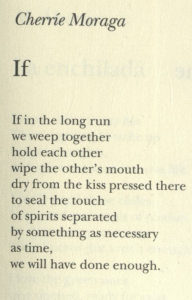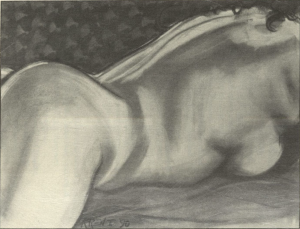
Featured in Carla Trujillos’ anthology, “If” exemplifies the pinnacle of brown queer love.
Brown queer love must be represented to demonstrate that assimilation is not necessary to actualize queerness, in the same way that repression of one’s queerness is not required to claim one’s Latinx identity. Cherríe Moraga’s poem “If” depoliticizes lesbian love and sex by depicting the tenderness and humanity in her own relationship. The line,” wipe the other’s mouth/ dry from the kiss pressed there” incorporates sensuality opposed to a fetishized lesbian eroticism. Queer Latina stories dismantle machismo by refusing to acquiesce into structures that require their subordination for community advancement. By presenting her relationship with the lines, “we will have done enough” in reference to simply existing together, Moraga simplifies discourse of the necessity of men through the medium of love. To love a woman freely and openly is to resist Chicano narratives of being a traditional housewife to a man. To free oneself from machismo is not to reject one’s culture but to reject one’s oppression, and queer Chicanas are manifestations of this separation. Moraga also resists conceptions of queer romance as a phase through lines such as , If in the long run/ we weep together/ hold each other.” This prevents the limitation of women’s ability to imagine queer futures because it does not relegate lesbianism to fleeting youth. This allows for the extension of female queerness into adulthood, and establishes the Chicana lesbian as a whole and valid identity within both Chicana/o/x and feminist culture. . Moraga does not denigrate her culture, and opens space for lesbianism within the Chicana community without isolating either group. Her truthful recounting of a love story is so purely human that it strikes to the heart of lesbianism, which is the ability of non-men to love other non-men freely. Reconciling queerness and the Latinx community from two separate spheres into a singular existence through poetry improves the intersectionality of both the queer and Latinx community by simultaneously challenging racism and homophobia.

Amor, Karen T. Delgadillo, pastel, featured in Carla Trujillo’s anthology.
“voz en una cárcel” by Juanita M. Sanchez depicts an alternate experience of struggling to feel safe within queer spaces and her own relationship due to discrimination and cultural differences. The poem raises the question if love is enough to bridge the gap between two women from differing backgrounds. Sanchez compares her longing for acceptance with her internal discomfort at feeling belittled by a white partner. The lines “we instituted language means nothing/ as long as we have each other to love/ you laughed at my accent/ maybe,/maybe just one too many times.” It personalizes the split between the two communities by trying to reconcile Sanchez’s yearning for affection from her partner with the feeling that she is perceived as inferior due to her being Chicana. Insecurity also manifests in the lines, “ i never know/ am i being too spanish or not enough english?”. The white partner comes to represent the lesbian community, and that her Chicana identity excludes her from not just individual love from her partner, but the acceptance of the lesbian community. The physiological effects of constantly altering one’s cultural presentation for the comfort of their partner symbolizes the themes of Chicano and lesbian culture being the antithesis to each other. This conflict is represented in Sanchez’ internal battle for one identity to be more dominant than the other. The idea that holding Chicana and lesbian identities in tandem is impossible without sacrifice on a certain level is simultaneously a central struggle felt by Chicana lesbians and something they fight to dispel through their existence. In order to carve out a space with queer communities as woman of color confidently, ins cuties about race arise in personal ways that reveal the work that needs to be done to normalize brown queerness.
Trujillo, Carla, and Cherríe Moraga. “If”, Chicana Lesbians: The Girls Our Mothers Warned Us About, Third Woman Press, Berkeley, 1994.
Trujillo, Carla, and Juanita M. Sanchez. “voz en un cárcel”, Chicana Lesbians: The Girls Our Mothers Warned Us About, Third Woman Press, Berkeley, 1994.
Trujillo, Carla, and Karen T. Delgadillo. “Amor”, Chicana Lesbians: The Girls Our Mothers Warned Us About, Third Woman Press, Berkeley, 1994.
